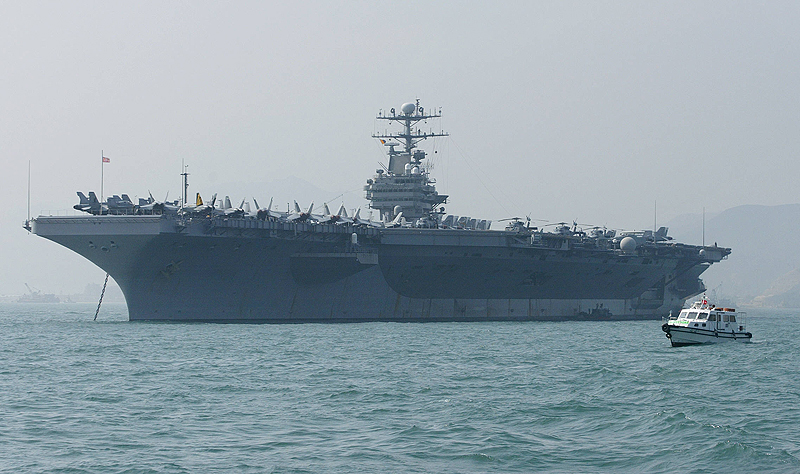A 'clear and unmistakable' message to Iran
WASHINGTON: The United States is sending an aircraft carrier strike group and a bomber task force to the Middle East in a "clear and unmistakable" message to Iran, National Security Advisor John Bolton said yesterday. "In response to a number of troubling and escalatory indications and warnings, the United States is deploying the USS Abraham Lincoln Carrier Strike Group and a bomber task force to the US Central Command region," Bolton said in a statement.
The deployment is aimed at sending "a clear and unmistakable message to the Iranian regime that any attack on United States interests or on those of our allies will be met with unrelenting force," Bolton said. "The United States is not seeking war with the Iranian regime, but we are fully prepared to respond to any attack, whether by proxy, the Islamic Revolutionary Guard Corps, or regular Iranian forces."


The USS Abraham Lincoln has previously been deployed to the Gulf, including during the 2003 US-led invasion of Iraq. The statement did not specifically state why the deployment is taking place now, but Secretary of State Mike Pompeo later said it was not related to Gaza, where Palestinian militants and Israel have traded a barrage of rocket fire and air strikes in recent days.
"It is absolutely the case that we have seen escalatory actions from the Iranians and it is equally the case that we will hold the Iranians accountable for attacks on American interests," Pompeo said. "If these actions take place, if they do by some third-party proxy, a militia group, Hezbollah, we will hold the Iranian leadership directly accountable for that," the chief US diplomat said before leaving on a trip to Finland.
Pompeo did not elaborate on what Iranian "escalatory actions" he was referring to. The deployment comes amid heightened tensions between Washington and Tehran over the latter's nuclear program, with the US taking aim at Iranian enriched uranium exports with sanctions. The US unilaterally withdrew from the 2015 Iran nuclear deal with world powers a year ago and instead vowed "maximum pressure" aimed at curbing the regional role of Iran, an arch-rival of US allies Saudi Arabia and Israel. In April, the US also declared Iran's elite Revolutionary Guards a "foreign terrorist organization."
Iran may retaliate
Meanwhile, Iran may announce retaliatory moves against the United States on the one-year anniversary of the US pullout from the nuclear deal tomorrow, the semi-official news agency ISNA reported. The US unilaterally withdrew on May 8, 2018 from the 2015 multilateral deal known as the Joint Comprehensive Plan of Action (JCPOA) under which Iran agreed to halt its nuclear program in exchange for the lifting of biting sanctions.
Quoting what it called informed sources, ISNA said yesterday that President Hassan Rouhani was likely to announce "step-by-step plans" for "reciprocal measures" on the anniversary of the US pullout. The rest of the ISNA report was not attributed to any source. According to the agency, the measures would include the "partial and complete reduction of some of Iran's commitments and restarting part of nuclear activities halted in the framework of the JCPOA."
The report said the measures would be in line with two sections of the accord. The two sections - 26 and 36 - open the way for Iran to cease some or all of its commitments under the deal if the United States or other parties fail to adhere to it, including the reimposition of sanctions. "This will be Iran's first step toward reacting to the US withdrawal from the JCPOA and also European countries' failure to live up to their commitments," said ISNA.
European Union officials "who have just made unfulfilled promises during the last year" had been unofficially informed of the decision, the agency added. The three European parties to the deal, Britain, France and Germany, announced the establishment of a special payments system called INSTEX-Instrument in Support of Trade Exchanges-in late January as a means to bypass renewed US sanctions.
The trade mechanism meant to the save the deal, however, was dismissed by Iran's supreme leader Ayatollah Ali Khamenei as a "bitter joke" as the difference between EU obligations and their proposals was "as far as the earth is from the sky". In a move escalating tensions, the US National Security Advisor John Bolton said on Sunday that the United States was sending an aircraft carrier strike group and a bomber task force to the Middle East in a "clear and unmistakable" message to Iran.
The United States was also aiming to put more pressure on the Iranian economy by targeting its petrochemical sales in a new round of sanctions, the Wall Street Journal reported. The White House also ended oil purchase waivers granted to Iran's main customers-including China, India and Turkey-meant to cut Iran's access to its main source of foreign currency revenue as part of its campaign of "maximum pressure" against the Islamic republic.- Agencies

